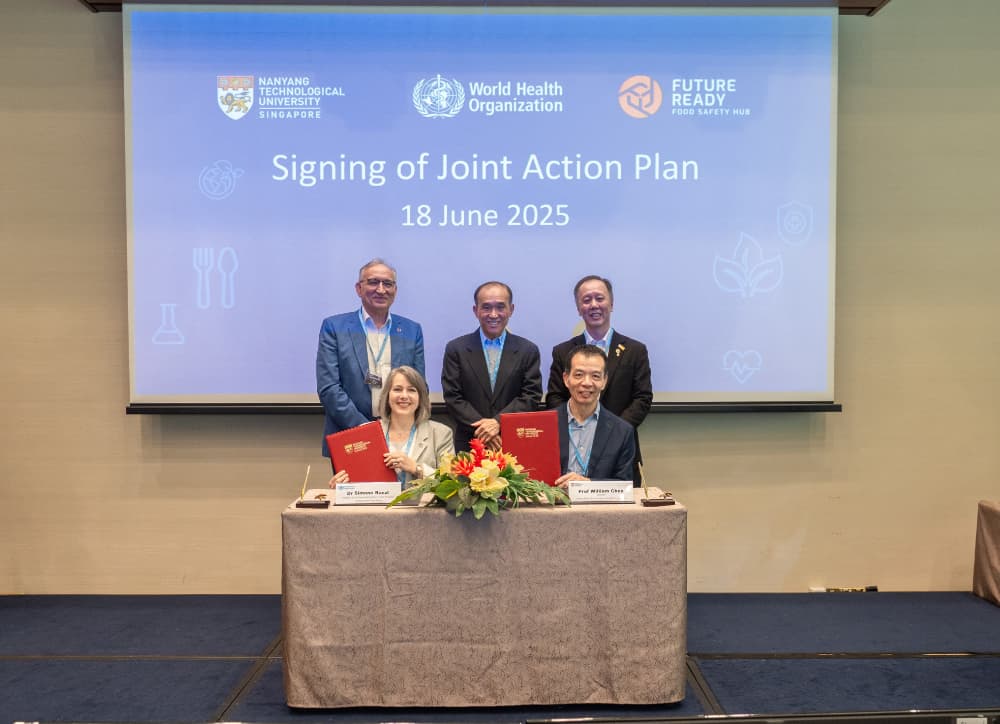NTU Singapore partners with WHO to advance AI-driven food safety assessment
NTU Singapore and the World Health Organisation have launched a three-year collaboration to transform global food safety standards through artificial intelligence and digital modelling technologies. The partnership aims to enhance risk assessment capabilities for novel food systems including cultured meat and precision-fermented products.
The collaboration between Nanyang Technological University, Singapore and WHO was announced during the WHO-NTU Joint Workshop on New Approach Methodologies in Future Food Safety Risk Assessment, held at Royal Plaza on Scotts in Singapore on 18 June 2025.
New approach methodologies target emerging food categories
The partnership will focus on implementing New Approach Methodologies (NAMs), incorporating cutting-edge AI and digital modelling techniques to assess risks associated with novel and emerging food systems. These methodologies are designed to provide more robust assessments whilst reducing uncertainty in regulatory frameworks.
Professor William Chen, Director of the Future Ready Food Safety Hub (FRESH) at NTU Singapore, emphasised the global health implications: “This collaboration with WHO underscores NTU’s commitment to advancing food safety science and innovation. Supported by FRESH and our partners in the Singapore ecosystem, we aim to develop robust methodologies that will benefit global public health, particularly to assess and regulate novel food innovations.”
The project specifically targets novel food categories including cultured meat, functional foods, and precision-fermented products—areas where traditional risk assessment approaches face significant challenges due to limited historical data and novel production methods.
Tripartite partnership strengthens Singapore’s food safety ecosystem
The initiative leverages FRESH, a tripartite partnership between NTU Singapore, the Agency for Science, Technology and Research (A*STAR), and the Singapore Food Agency (SFA). This collaboration structure positions Singapore as a key hub for international food safety innovation.
Mr Lim Chuan Poh, Chairman of SFA and Guest of Honour at the signing ceremony, highlighted the strategic importance: “This project is an illustrative example of how international collaborations can drive innovation in food safety science. As Singapore develops a more resilient and robust food system, global partnerships like this will play a vital role in ensuring the safety, trust, and sustainability of both local and global food supply chains.”
Computational models and in vitro assays enhance regulatory readiness
The collaboration will develop technical guidance incorporating in silico computational models and in vitro assays to improve food safety assessment protocols. These methodologies represent a shift from traditional animal testing approaches towards more efficient, ethical, and scientifically precise assessment tools.
Dr Simone Moraes Raszl, Scientist for Multisectoral Action in Food Systems at WHO, outlined the global impact: “Ensuring safe food is fundamental to global health, sustainable development, and resilient societies. Our joint efforts with NTU Singapore exemplify our collective commitment to advancing science-driven solutions that can be shared and scaled across borders. By harnessing innovation and international expertise, we are laying a strong foundation for the future of food safety worldwide.”
Capacity building programme addresses global regulatory challenges
Joint activities under the agreement include capacity-building workshops, scientific publications, and the establishment of an applied framework for integrating NAMs into national food safety systems. These initiatives are designed to support WHO member states in strengthening their food safety risk assessment capabilities.
The partnership addresses critical gaps in regulatory preparedness for emerging food technologies, particularly in developing nations where traditional risk assessment infrastructure may be limited. By providing standardised methodologies and training programmes, the collaboration aims to ensure consistent global food safety standards.




